|
|
|
Sort Order |
|
|
|
Items / Page
|
|
|
|
|
|
|
| Srl | Item |
| 1 |
ID:
161644
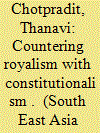

|
|
|
|
|
| Summary/Abstract |
The Boworadet Rebellion in October 1933 brought brutality into the heart of Thailand’s politics. It was followed by a proliferation of commemorative practices focusing on the commoners who sacrificed their lives for the country. In the aftermath of the incident, the search for an appropriate language of loss involved the making of a new meaning of national sacrifice and what it was to be a good citizen. This article considers the nationalisation of death, as manifested in the commemorative visual forms of the crematorium for the 17 soldiers and police officers at Sanam Luang and the Safeguarding the Constitution Monument in Lak Si District. It concentrates on the appropriation of royal inheritance by the People’s Party and the transformation of phan ratthathammanun (a Book of the Constitution on an ornate double tray), which first appears in an anti-royalist context after the revolutionaries suppressed the Boworadet Rebellion. The presence of phan ratthathammanun in this context marks the separation of constitutionalism from royalism and establishes it as a stand-alone symbol of a supreme ideology worth dying for. This article analyses the visual culture of the period following the Boworadet Rebellion in relation to the formation of the Boworadet Rebellion war memory, the new ideology of constitutionalism and the new identity of the Thai people as citizens of the nation instead of subjects of the King.
|
|
|
|
|
|
|
|
|
|
|
|
|
|
|
|
| 2 |
ID:
161647
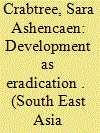

|
|
|
|
|
| Summary/Abstract |
The political rhetoric of social and economic development in Malaysia is used as a dominant and largely unquestioned discourse to justify the industrialized exploitation of the traditional territories of the indigenous people of West Malaysia. This article explores social policy drivers in respect of findings from a condensed ethnography of the Jakun Orang Asli people of Tasik Chini in the State of Pahang. Tasik Chini provides an important example of a wider problem affecting many Orang Asli communities in Malaysia relating to industrial exploitation, but is a case of special interest in respect of its significance as a site of rich and unique biodiversity, as well as being home to one of only two freshwater lakes in West Malaysia. Notably, Tasik Chini is also a UNESCO Biosphere Reserve, of which there are only two in Malaysia. The lake and surrounding forests have provided the Jakun villagers with abundant natural resources for subsistence, but now the area is badly eroded and polluted by the ravages of big business. This presents a serious dilemma for the Jakun concerning whether to resist the destruction of their traditional way of life or to comply with state agendas and collude with their loss of self-sufficiency and autonomy. As such, the situation in Tasik Chini raises important questions regarding national social policy drivers and the position and welfare of indigenous people in Malaysia.
|
|
|
|
|
|
|
|
|
|
|
|
|
|
|
|
| 3 |
ID:
161649
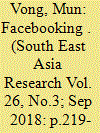

|
|
|
|
|
| Summary/Abstract |
This article takes a critical view of online activism as its point of departure and explores how the activities of Cambodian youth on Facebook have spilled over into formal politics. Contrary to concerns that Facebook and other social media tools distract activists from more effective means of political participation, this article suggests that facebooking has contributed positively to offline political participation. More importantly, the petty acts of discussing and sharing information on Facebook have, on occasion, succeeded in triggering changes in government decisions and behaviours. In developing these arguments, we draw upon everyday politics perspectives which provide the theoretical ground to qualify facebooking as political and make sense of its importance.
|
|
|
|
|
|
|
|
|
|
|
|
|
|
|
|
| 4 |
ID:
161646
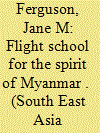

|
|
|
|
|
| Summary/Abstract |
In 1935, two Burmese filmmakers traveled to Tokyo with the intention of acquiring the latest sound recording equipment and training in sound-on-film production. In addition to these stated goals, in Japan they co-produced the feature film Japan Yin Thwe/Nippon Musume, ‘Japanese Darling.’ The film depicts daring young Burmese aviators and a budding romance with a Japanese woman. The active harnessing of the symbolic capital of aviation – the ideological notion of airmindedness – through the mimetic capacities of cinema, could be seen as a prescient example of Pan-Asianism, predating Daitoa Kyoeiken ‘Greater East-Asia Co-Prosperity Sphere’ propaganda. The film’s explicit encouragement of Burmese techno-nationalism offers a compelling contrast to other examples of anti-colonial nationalism, which emphasize notions of ethnic history and Buddhist morality and concerns of religious decline in the face of foreign imperialism. However, a comprehensive analysis of the film industry and commercial aviation in Japan in the 1930s reveals a structural impetus for this collaboration, arguably overshadowing ideological motivations and results.
|
|
|
|
|
|
|
|
|
|
|
|
|
|
|
|
| 5 |
ID:
161648


|
|
|
|
|
| Summary/Abstract |
Combining contextualization with textual analysis and theoretical engagement, this article examines how the work of Looi Yook Tho, an important voice in postcolonial Chinese Malaysian poetry, addresses questions of identity. The article argues that four recurring and interlinked concerns emerge in Looi’s poetry. First, his descriptions of the diasporic experience of Chinese pioneers in Malaya, through which their sense of ethnic identity was formed, demonstrate what is termed a ‘localized orientation’ in his writing. Second, by evoking traumatic memories, including of the 13 May Incident and of Operasi Lalang, Looi’s poems speculate on the national identity of Chinese Malaysians, and critique the country’s institutionalized racism and ethnolinguistic politics, though they lack critical thinking on the subject of colonialism. Third, when conveying nostalgia for his homeland, Looi delineates the making of self-identity and questions the ideology of developmentalism. Last, on the basis of an ethics of ‘togetherness-in-difference’, Looi seeks to re-imagine a national identity in which all Malaysians work together to confront the same social crises. Running through all these themes, with their critiques of capitalism and racism, is Looi’s search for a home(land).
|
|
|
|
|
|
|
|
|
|
|
|
|
|
|
|
| 6 |
ID:
161645
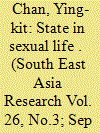

|
|
|
|
|
| Summary/Abstract |
During the 1970s, condoms were introduced into Singapore as a medical device. Health officials described men’s condom use as sharing women’s risks and responsibilities in birth control and family planning. For the officials, condom distribution helped contain the spread of venereal diseases, deal with unwanted pregnancies and maintain an optimal birth rate for national economic development. With the emergence of AIDS and a more self-assertive middle class of well-educated, globally aware citizens, the official discourse on male contraceptives came under fire from social conservatives, who associated condom use with the moral decline of society. This article examines the dialectical relationship between government policies and public perceptions of condom use in Singapore. The 1980s debates over condoms revealed greater male involvement in state-directed contraceptive projects and a burgeoning dichotomy between state and society.
|
|
|
|
|
|
|
|
|
|
|
|
|
|
|
|
|
|
|
|
|